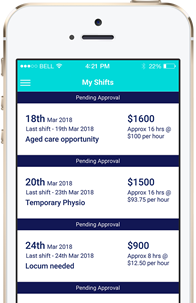It can be tricky managing staff in a healthcare business. Whether you work in aged care, private practice, hospital or the community there are some distinct challenges in managing a team in healthcare. Possibly, you work in a patient facing role too and managing your own case load and staff can be a balancing act. We’ve put together some key tips that will help you be more prepared and organised for creating and managing a great performance management infrastructure.
- Clear communication – The first step in aligning your team with company goals is clear communication to them around what these goals are. Once you have this clear communication set out and all staff understand the objectives of the company you are able to move into building a performance management plan that reflects the companies goals. Regular catch ups or check ins tend to help keep the message alive and front of mind for staff. We believe even having the companies goals clearly displayed either on a dashboard or on the office walls can help.
- Use effective tools – Having effective software tools to help manage staff performance is a huge time saver and can help you manage the workload when you may have a million other things to think about. Try a number of the HRM software packages available online and figure out which one is most suitable for your business. As is with most software solutions the time saved in administration and potential double ups is invaluable. Further to this, in most products staff are able to ad notes to their performance goals in real time.
- Give feedback more – It’s no secret that staff maintain motivation if communication is free flowing. Feel free to give feedback and ask for feedback whenever you think it might be warranted. Keep conversations about the positives and if there are holes to fix then provide solutions on how you think this can be done together. Engaging staff in these conversations more often will help them understand that you want them to be the best at what they do.
- Recognition – Managers can sometimes get into a trap that if the company as a whole isn’t meeting objectives then individuals are not rewarded for their great performance. One of the key takeaways is that each individuals performance needs to be evaluated and recognised if they are performing well irrespective of other environmental conditions.
- Set and keep reviews at regular intervals – Often a failure of managers is to set consistent intervals and constantly changing the way evaluations are done. This might just be another job that you need to do but you are effectively talking about the person and their career. For them this conversation is important, constantly changing or not keeping these review dates can discourage and demotivate staff severely.





